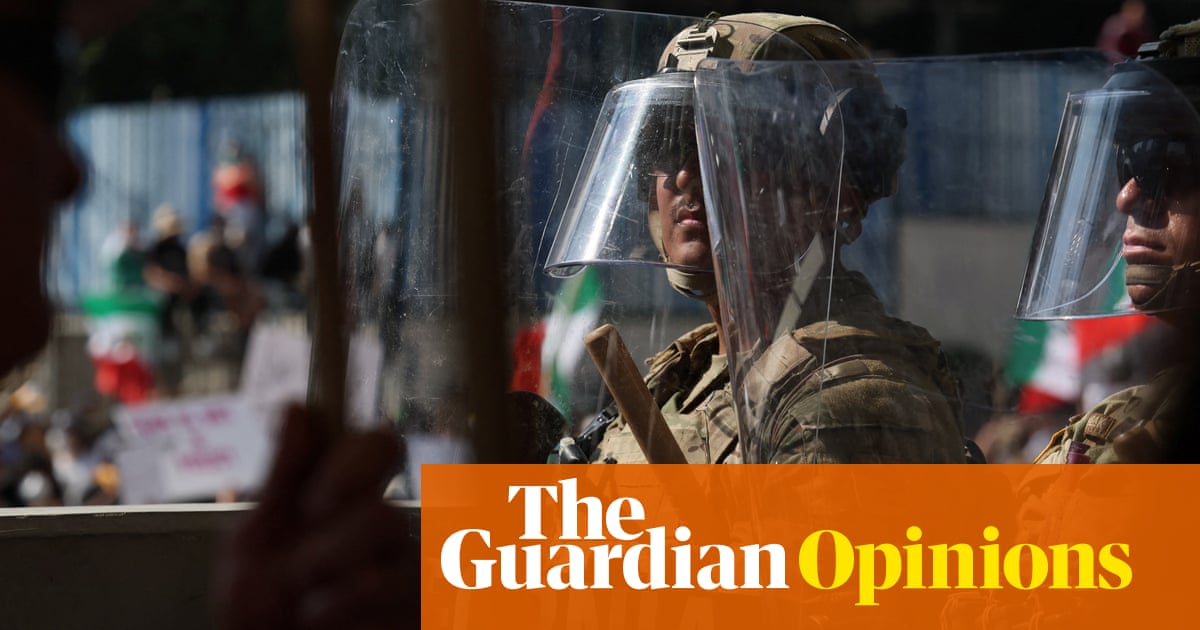Donald Trump was on his way to Camp David for a meeting with military leaders on Sunday when he was asked by reporters about possibly invoking the Insurrection Act,allowing direct military involvementin civilian law enforcement. Demonstrations against Trump’s draconian immigration arrests had been growing in Los Angeles, and some of them had turned violent. Trump’s answer? “We’re going to have troops everywhere,” hesaid.
I know Trump is “a delusional narcissist and an orange-faced windbag”, toborrow the wordsof the Republican senator Rand Paul, and that this president governs using misdirection, evasion, and (especially) exaggeration, but we should still be worried by this prospect he raises of sending “troops everywhere”.
Already, Trump and his administration have taken the unprecedented steps of calling up thousands of national guard soldiers to Los Angeles against the wishes of the California governor, ofdeployinga battalion of hundreds of marines to “assist” law enforcement in Los Angeles, and of seeking tobanthe use of masks by protesters whiledefendingthe use of masks for Immigration and Customs Enforcement (Ice) agents. Needless to say, none of this would be happening if these times were normal.
What makes this moment abnormal is not the fact that Los Angeles witnessed days ofmostly peacefulprotests against massive and destructive immigration arrests. We’ve seen such protests countless times before in this country. Nor is it the fact that pockets of such protests turned violent. That too is hardly an aberration in our national history. What makes these times abnormal is the administration’s deliberate escalation of the violence, a naked attempt to ratchet up conflict to justify the imposition of greater force and repression over the American people.
The Steady State, a non-partisan coalition of more than 280 former national security professionals, has issued a warning over these events. “The use of federal military force in the absence of local or state requests, paired with contradictory mandates targeting protestors, is a hallmark of authoritarian drift,” the statementreads. “Our members – many of whom have served in fragile democracies abroad – have seen this pattern before. What begins as provocative posturing can rapidly metastasize into something far more dangerous.”
The hypocrisy of this administration is simply unbearable. If you’re an actual insurrectionist, such as those who participated in the January 6 attack on the United States Capitol by destroying federal property and attacking law enforcement officers, you’llreceivea pardon or a commutation of your sentence. But if you join the protests against Ice raids in Los Angeles, you face military opposition.
Then there’s Stephen Miller. The White House deputy chief of staff unironicallypostson social media that “this is a fight to save civilization” with no apparent awareness that it is this administration that is destroying our way of life, only to replace it with something far more violent and sinister.
Are we about to see Trump invoke the Insurrection Act? It’s certainly possible. On the White House lawn on Monday, Trump explicitly called the protesters in Los Angeles “insurrectionists”, perhaps preparing the rhetorical groundwork for invoking the act. And by invoking the Insurrection Act, Trump would be able to use the US military as a law enforcement entity inside the borders of the United States – a danger to American liberty.
The Insurrection Act has been used about 30 times throughout American history, with the last time being in Los Angeles in 1992. Then, the governor, Pete Wilson, asked the federal government for help as civil disturbances grew after the acquittal of four white police officers who brutally beat Rodney King, a Black man, during a traffic arrest. The only time a president has invoked the Insurrection Act against a governor’s wishes has been when Lyndon Johnson sent troops to Alabama in 1965. But Johnson used the troops to protect civil rights protesters. Now, Trump may use the same act to punish immigration rights protesters.
One part of the Insurrection Act allows the president to send troops to suppress “any insurrection, domestic violence, unlawful combination, or conspiracy” in a state that “opposes or obstructs the execution of the laws of the United States or impedes the course of justice under those laws”. According to Joseph Nunn at theBrennan Center, “[t]his provision is so bafflingly broad that it cannot possibly mean what it says, or else it authorizes the president to use the military against any two people conspiring to break federal law”.
No doubt, Trump finds that provision to be enticing. What we’re discovering during this administration is how much of American law is written with so little precision. Custom and the belief in the separation of powers have traditionally reigned in the practice of the executive branch. Not so with Trump, who is dead set on grabbing as much power as quickly as possible, and all for himself as the leader of the executive branch. To think that this power grab won’t include exercising his control of the military by deploying “troops everywhere”, whether now or at another point in the future, is naive.
Such a form of governance, with power concentrated in an individual, is certainly a form of tyranny. But tyranny, as Hannah Arendt reminds us in On Violence, is also “the most violent and least powerful of forms of government”. And while a government may have the means to inflict mass violence, it is ultimately the people who hold the power. These are the lessons we need to be studying, and implementing on our streets everywhere, while we still can.
Moustafa Bayoumi is a Guardian US columnist
